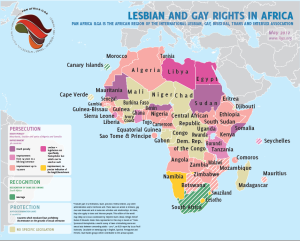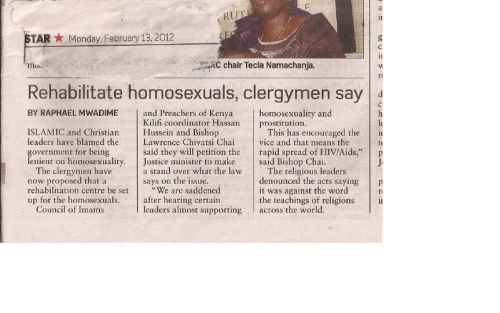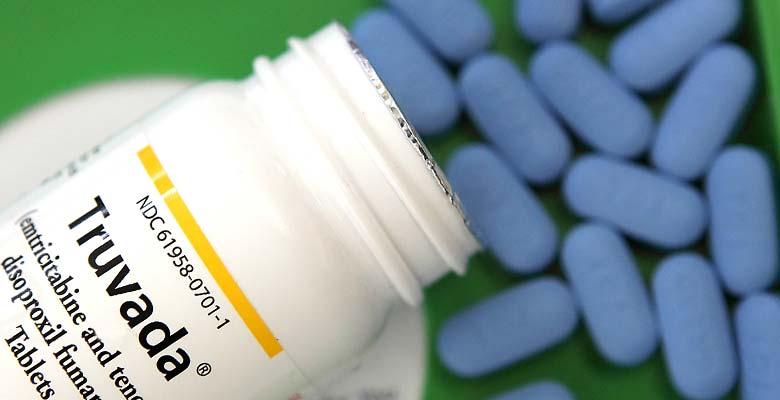Rise of HIV in Kenya is driven by homophobia
In a small article in today’s Daily Nation (12th August 2013), ‘The wag’ argued against the general statement that the gay community has some of the highest HIV prevalences. His take was that gay men are at a much higher risk of acquiring HIV than gay women. I liked his rather non-judgemental blunt approach to the topic. Rather refreshing in a county where the practise of homosexuality carries a 14-year sentence, sounds bad, but its worse in other parts of Africa.

Last year, I spend a couple of days in the company of gay men and also men who sell sex to other men – getting my mind round these issues. At the end of my time with them, I was convinced that homophobia is fuelling the spread of HIV in Kenya. This is the article I wrote.
At the beginning of the HIV epidemic in Africa, it was clear that the dominant mode of spread was through heterosexual transmission. Focusing attention on breaking transmission saw a drop in HIV prevalence in Kenya from 14 percent in the late 1990’s to the current 6 percent.
However, in recent years, it has been recognised that the HIV epidemic in African countries is more complicated than originally thought. High risk groups such as sex workers, intravenous drug users and Men who have Sex with Men (MSM) have been found to me more affected with HIV than the general population.
In sub-Saharan Africa, MSM have an overall HIV infection rate that is 5 to 20 times that of men in the general population. According to data from National AIDS and STI control Programme (NASCOP) in Kenya, as many as 1 out of every 5 MSM will be HIV positive while in the generation population less than 6 out of every 100 men will be HIV positive.
Although many would like to dismiss this as a problem of ‘that type of people’, the reality on the ground is different. According to ‘Most-At –Risk Populations (MARPS) surveillance report published by NASCOP in 2012, nearly 40 percent of MSM have been married to women at some point in their lives and 13 percent are still married to women. This is the reason why the term MSM is used instead of homosexuals as many MSM do not self-identify as homosexuals. In Kenya, it is estimated that 1 out of every 100 men will have a homosexual experience in their lifetime. Many MSM lead a closeted lifestyle, having sex with men in secret but meeting cultural norms by marrying women and having children. Due to the difficulty of having open relationships with other men, many of these closest MSM seek the services of male commercial sex workers.
Interviews with 4 (2 of whom are HIV +ve) male commercial sex workers who sell sex to men in Malindi and Mombasa revealed the scale of the problem. These men reported having 2 to 9 clients a night, almost all of whom were local men, married with children. Many of their clients choose one male commercial sex worker with whom they have a long-term relationship with the understanding that this will remain a private affair. As is common with most long-term relationships, the use of condoms stops.
These long-term relationships do eventually break up and it is likely that the virus has been passed on to both the client and his wife and will soon be passed to the next partner.
Two of the male commercial sex workers I interviewed in Malindi are HIV positive. Fortunately, they have access to care at the Malindi District Hospital which has a HIV comprehensive care clinic that does not discriminate people on the grounds of their sexual orientation.
However, MSM will often fear to seek help in public hospitals because they cannot be assured of fair treatment. They are afraid of their sexual orientation becoming a topic of discussion among health care providers and many seek care at private clinics. Those that cannot afford private care will often seek help from herb or traditional healers who will be unable to provide the care they would otherwise have received in a public health facility. It is an established fact that access to anti-retrovirals (ARV) brings down the levels of the virus in the blood and massively reduces HIV transmission to others.
Although the ministries of health through NASCOP accept that MSM are at increased risk of HIV and have problems seeking health care, criminalisation of homosexuality makes it difficult to drive control programs. Refusing to face the reality that high risk groups like MSM, commercial sex workers and Intravenous drug users are sexually interlinked to the general population means that the rates of HIV in the country are unlikely to go down.
Comment
Comments are closed.




Shadrack Babu.
wow! That’s the plain truth. The only way to fight the spread of HIV is by giving them a conducive enriroment where they can freely acess care services and be counselled on safer sex practices. Some also engage in anal sex practices with the beleieve that, HIV can not be transmitted anally. It’s high time that we accept the reality, since it is the only way we can win the fight against the rising spread of HIV infections.
S.Babu.